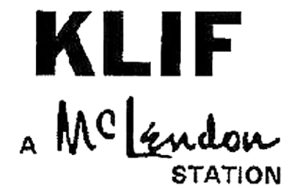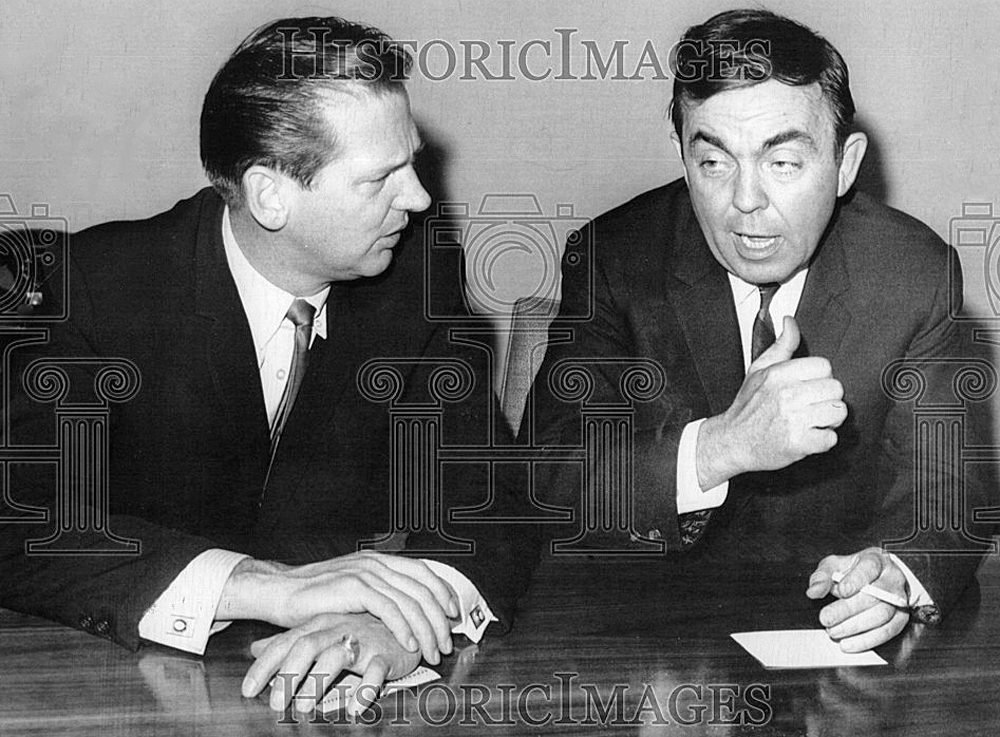 From the MCRFB NEWS archive: 1967
From the MCRFB NEWS archive: 1967
Gordon McLendon “Lyric-Seeking” Panel Seek To Weed Out Suggestive Records
NEW YORK — Gordon McLendon, president of the McLendon radio chain, is going to set up a lyric-testing panel of “prostitutes, ex-prostitutes, junkies and ex-addicts” to assist in weeding out suggestive records. This is the latest declaration McLendon has made in his campaign against “filth” in the music-record industry.
 The chain has set May 15 (this was published in an April 8 Billboard advertisement) as the deadline by which all record companies will have to provide printed lyrics with new records or stand the risk of not having them played on the air. McLendon is seeking to carry this campaign to every radio station in the nation and, so far, is riding a groundswell of enthusiasm, especially at the grassroots level, but also from major stations and broadcasting chains.
The chain has set May 15 (this was published in an April 8 Billboard advertisement) as the deadline by which all record companies will have to provide printed lyrics with new records or stand the risk of not having them played on the air. McLendon is seeking to carry this campaign to every radio station in the nation and, so far, is riding a groundswell of enthusiasm, especially at the grassroots level, but also from major stations and broadcasting chains.
The success of the nationwide purge, he admitted in an exclusive interview, “depends on the support of other radio stations throughout the country. If joined by other important stations – and some have already joined – then the irresponsible element of the record industry we’re concerned about will have to co-operate.”
But, regardless, the current wave of records featuring sex-suggestive lyrics or lyrics pushing dope brought him to the point “where I couldn’t live with myself. Not because I was aware of doing anything wrong, but because I felt we were not policing the music satisfactorily.” McLendon said that his national program director, Bill Stewart, had suggested attempting to interest the radio industry in a voluntary crusade.
To combat “hippy” phrases in many of the lyrics in question on today’s records. McLendon last Saturday began work on his unusual lyric-testing panel –“five to seven people of different backgrounds, maybe a prostitute, an ex-prostitute, a junkie, an ex-addict.”
On any lyric found difficult to understand, he said the chain would telephone one of the panel members and read the lyric to them. “Best we can do, then, is say the lyrics are probably all right if they pass our informal jury.”
Questioned about the possibility of providing a “dictionary of hip slang” to his stations – which include KLIF in Dallas, WYSL in Buffalo, N. Y., and KILT in Houston – McLendon felt this would not help because teen slang changes so rapidly, “almost by the week.”
Moral Obligation
But he felt a moral responsibility to do something constructive and do it quick. “I’ve just come back from Sweden and they are having a serious problem with marijuana.” Use of marijuana is common, he said, even at the 8 and 9-year old level. It’s a “desperate situation.”
He said he didn’t want to pose as an authority on marijuana, “because I’m not, But it is the first step toward the really hard stuff.” He felt this allegory could be also put forth toward smutty records; “maybe this will be the first breakdown for the morals of teens and sub-teens in the United States.” Kids, he felt, begin their really first contact with the adult world through listening to radio and watching youth shows on TV. If this first contact makes drugs and illicit sex attractive, “we’ve been just as guilty as those who do the pushing of drugs. I feel very strongly about this.”
How strongly is evident by the fact that he taped a Mike Wallace show last Wednesday attacking dirty lyrics and earlier that day delivered a speech before the national convention of the American Mothers Committee at the Waldorf- Astoria here, in which he said, “The McLendon radio stations will not air records that offend public morals, dignity or taste either innocently or intentionally. We’ve had all we can stand of the record industry’s glorifying marijuana, LSD, and sexual activity. The newest Beatles record, out next week, has a line of 40,000 purple hearts in one arm. Is that what you want your children to listen to? I certainly don’t think so.”
One of the new songs mentioned in his speech was “Try It,” by The Standells. McLendon urged members: “When you go back to your own communities, let your radio stations know that you are behind this campaign.” He called for “a rather updated version of the Boston Tea Party. Two centuries later, now, I suppose we might call it The Wax Party – one in which we urge all the distasteful English records that deal with sex, sin and drugs (this is not to say the British music or record industry is the only offender).
At the same time, I think it is past the time that we made an attempt to stop whatever few irresponsible elements of the British music and record industry there are in existence from influencing our children with their double ententes and, in some instances, single ententes of unmistakable meaning.”
On the Mike Wallace show, McLendon said, “I think we’re going to get badly hurt by this stand because we’re never going to know from what direction the attacks will be coming. It’s unfortunate that a great deal of the opposition will be like germ warfare, because you could scarcely expect the people to come out and insist they be given the right to continue recording filth.”
He told Billboard that, “I’ve got to ban these records … or be called a liar by the radio industry.” Quite a number of the records the station would be banning, he said, might get played on other radio stations and be high on their charts. He said that McLendon stations might even suffer in ratings because of not playing these records. “Being a practical businessman, I had to think of this. But I said, ‘Let her rip!’ and that’s what we are going to do.” For six months or more to come, he felt the broadcasting chain would find all types of bugs in policing the music and “some elements of the standards we’ve so pragmatically set will have to change, but I think this is, at least, the beginning of what could be something very, very good. We’re going to be working on this.” END
___
(Information and news source: Billboard; May 20, 1967)

![]()
